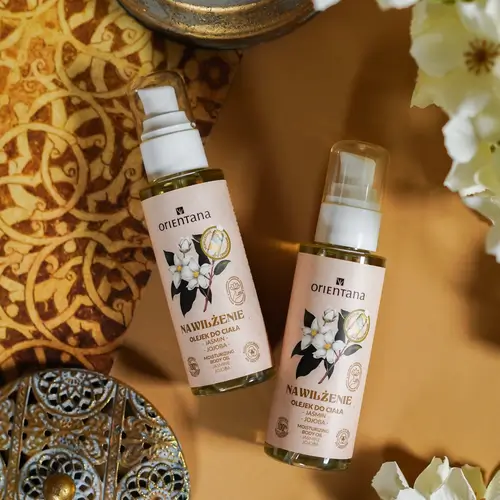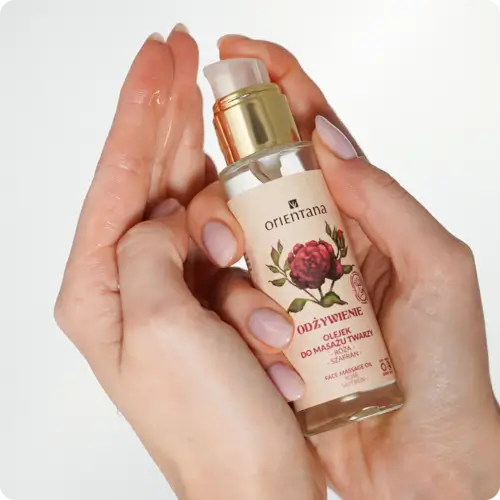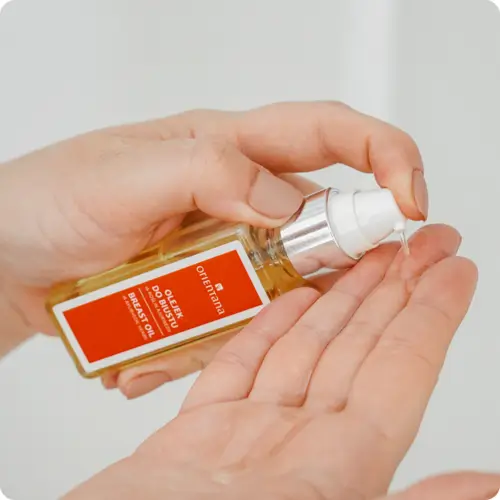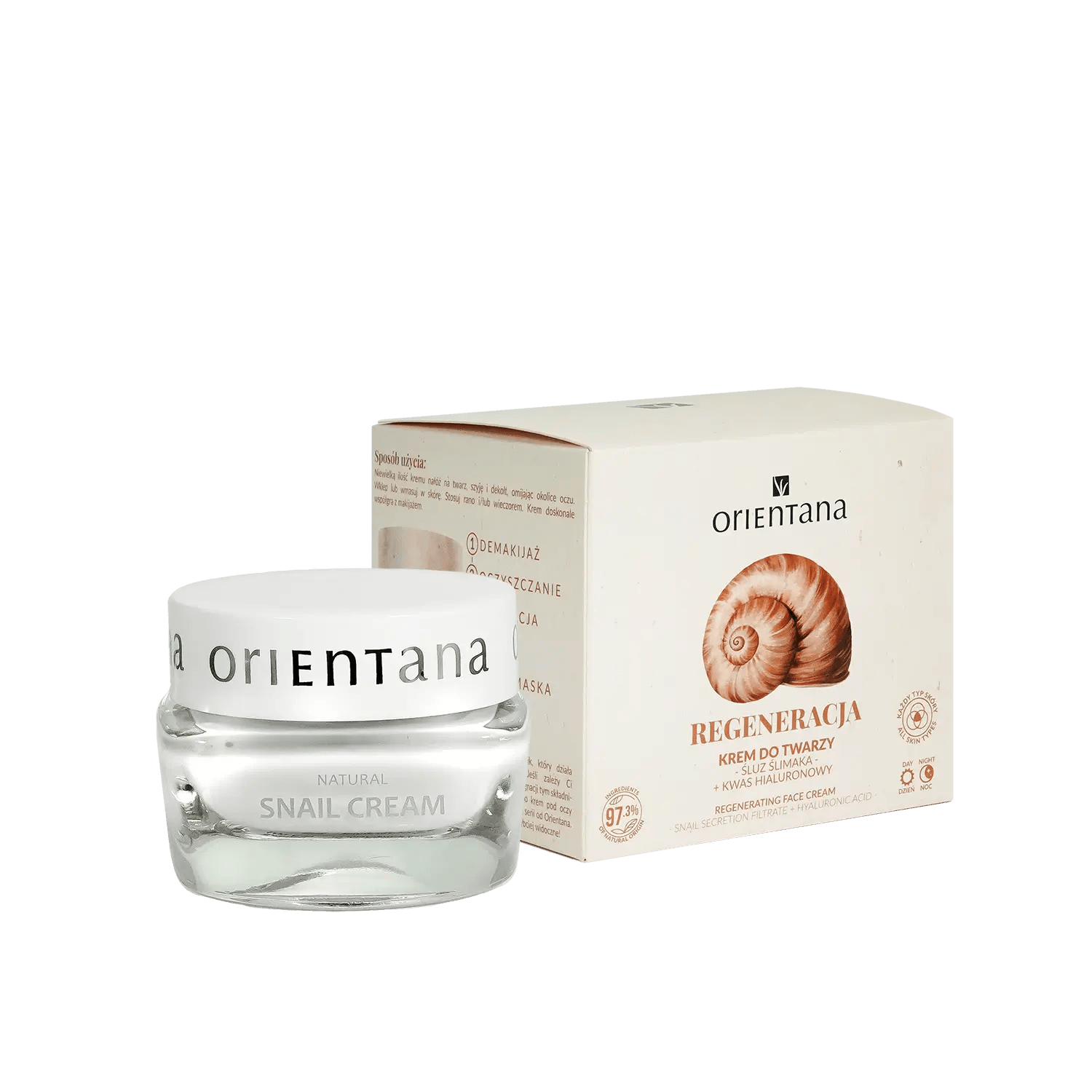Dry skin is a common dermatological problem that affects people of all ages. It is characterized by insufficient moisture in the stratum corneum of the epidermis, which leads to its roughness, flaking, a feeling of tightness and a tendency to irritation. According to epidemiological studies, dry skin is especially severe in winter and in regions with low air humidity. Natural cosmetics are becoming an increasingly popular solution in skin care, which is due to their mildness and lack of synthetic irritants.

Dry skin and its causes
Dry skin can be caused by exogenous and endogenous factors. Exogenous factors include environmental conditions such as low humidity, exposure to wind, frost and UV radiation.
Another cause is improper care: frequent use of strong detergents and hot baths that cause removal of protective lipids of the epidermis. Dry skin also torments us because of a poor diet. A diet poor in unsaturated fats and vitamins - especially vitamins A, E and D.
Endogenous factors are factors that we have no influence on. Among them is skin aging . With age, the production of sebum and natural moisturizing factors (Natural Moisturizing Factor, NMF) decreases. Dry skin is much more bothersome in adulthood. Dry skin is the result of dermatological diseases, e.g. atopic dermatitis, psoriasis and ichthyosis. Dryness is also experienced as a result of hormonal disorders. It often occurs in hypothyroidism.

The role of natural cosmetics in dry skin care
Natural cosmetics are characterized by the presence of plant and mineral ingredients that support the skin's natural regenerative mechanisms. These ingredients are divided into humectants - substances that bind water, such as vegetable glycerin, aloe and hyaluronic acid. Studies show that glycerin improves the hydration of the stratum corneum after the first application, as proven in a study conducted by Wissing and Müller (2002).
Emollients are plant oils that create an occlusive layer on the skin surface, preventing water loss. A study by Loden (2003) showed that emollients effectively restore the lipid barrier of the epidermis.
Dry skin will thank you for oiling your body . Create a home spa and allow yourself a moment of relaxation. Perform a massage with Jasmine Oil , which will not only moisturize the skin but will also be aromatherapy for you.

Proven effects of natural cosmetics
Dry skin is a problem that can be effectively alleviated by using natural cosmetics containing humectants, emollients and antioxidants. Numerous scientific studies confirm the effectiveness of ingredients such as glycerin, hyaluronic acid and vegetable oils in restoring the skin's hydrolipid balance. The effects of natural ingredients and cosmetics on dry skin prove that they have an extraordinary effect. How are the effects of moisturizing cosmetics tested?
Skin hydration measurement (corneometry)
The skin moisture level after application of the cosmetic is measured using devices such as corneometer. Tests on aloe vera extracts have shown that application of aloe vera gel increases the moisture level in the stratum corneum by 15–20% after 2 weeks of use (Surjushe et al., 2008).
Dermatological tests
Tests on volunteers with sensitive skin are conducted to assess the tolerance of active ingredients. In a study of the effects of argan oil, regular use was found to reduce skin roughness by 43% after 4 weeks of application (Bouguenina et al., 2015).
Antioxidant tests (DPPH)
Assessment of the ability of natural cosmetics to neutralize free radicals. A study conducted on green tea extracts showed high effectiveness in protecting epidermal lipids against peroxidation (Sharma et al., 2010).
Causes of itchy skin
Dry skin is one of the most common causes of itching, especially in winter or in dry climates. It is characterized by flaking, redness, and a feeling of tightness, which can be exacerbated by improper care or environmental factors. Studies confirm that in low air humidity, transepidermal water loss (TEWL) increases by up to 50%, which leads to a deterioration of the skin's hydrolipid barrier.
Allergies are another common cause of dry skin and can be the result of contact with cosmetics, detergents, fabrics or eating certain foods. These symptoms often co-occur with a rash or hives, indicating an immune system reaction to allergens. According to epidemiological studies, about 20% of the population experiences an allergic reaction at least once in their life, manifesting itself as itchy skin.
Bites from insects such as mosquitoes, fleas, lice, and bedbugs can also cause itchy skin. Substances in the insects’ saliva trigger an inflammatory response at the bite site, which is confirmed by immunological studies showing elevated levels of histamine in skin lesions.
Many skin conditions are also associated with chronic itching. Atopic dermatitis (AD), an inflammatory and chronic skin condition, is associated with dryness, itching, and inflammation. Psoriasis, on the other hand, presents with itchy, scaly patches that result from abnormal proliferation of keratinocytes. Seborrheic dermatitis often affects the scalp and face, causing itching and flaking of the skin in these areas. Fungal infections, such as athlete's foot or jock itch, and parasitic infections, including scabies, are other causes of itching that are confirmed by numerous dermatological studies.
Some internal diseases can manifest as itchy skin as one of the first symptoms. Liver diseases such as cirrhosis, kidney failure, diabetes and hypothyroidism affect changes in the functioning of the body that can lead to skin discomfort. For example, in patients with chronic kidney failure, itching occurs in up to 40% of cases, which is associated with disorders of phosphate and calcium metabolism.
Stress and psychological disorders can also increase itching, which is known as psychogenic itching. Conditions such as anxiety, neurosis, or depression can affect the perception of itch, leading to an increase in symptoms. Neurophysiological studies show that activation of the hypothalamic-pituitary-adrenal (HPA) axis can have a significant impact on the occurrence of such symptoms.
Some medications, especially opioids and antibiotics, can cause itching as a side effect. This mechanism is often related to the release of histamine or other changes in the nervous system. In the case of pregnant women, hormonal changes, such as an increase in estrogen levels, can lead to itching, especially in the abdomen and thighs. According to studies, about 20% of women in the third trimester of pregnancy experience itching as a symptom of physiological changes in the body.
Dry skin and itching can have various causes, and their proper diagnosis and treatment requires taking into account many factors, such as the environment, the patient's health condition and the pharmacological therapies used.
Home remedies for itchy skin
Effective moisturising of dry skin can be achieved by using body butters and oils. They should contain as many natural ingredients as possible, for example ingredients such as shea butter, cocoa butter, kokum butter, known for their properties that retain moisture in the skin.
When using body oils, you need to pay attention to their composition and not use those with paraffin or mineral oil. These are derivatives of petroleum.
An important element of care is also soothing baths, to which you can add oatmeal, baking soda or moisturizing oils, which supports the regeneration of the skin's protective barrier and soothes irritation. In situations of sudden discomfort, cold compresses applied to itchy areas are effective, which reduce inflammatory reactions and bring relief.
It is also important to avoid cosmetics containing alcohol, which can further irritate the skin and increase dryness.
Wearing loose clothing made of natural fabrics, such as cotton, minimizes the risk of mechanical irritation and supports the epidermal regeneration process.
In the context of skin care, diet also plays an extremely important role, which should be rich in omega-3 fatty acids, vitamins A, C, E and zinc to support cell renewal and ensure proper nourishment of the skin from the inside.
the best oils

sesame oil
Sesame oil has a number of beneficial properties for the skin, as confirmed by scientific data on its composition and action. It contains about 40-60% unsaturated fatty acids, including 35 to 50% oleic acid, 35-45% linoleic acid and 7-12% palmitic acid.
Its high vitamin E content of 50-60 mg per 100 g makes it an effective antioxidant that helps protect the skin from oxidative stress. Applying sesame oil to the skin reduces transepidermal water loss (TEWL) by up to 22% in the first 24 hours, and regular use over a four-week period increases skin hydration by about 30%.
The lignans contained in the oil, such as sesamol and sesamolin, have strong antioxidant effects, with sesamol being estimated to be 10-20 times more effective than vitamin E in neutralizing free radicals.
The stability of sesame oil depends on storage conditions – in cold stores it maintains its properties for about 3-4 months, while at room temperature its shelf life is 1 to 2 months, after which the active ingredients degrade.
In traditional Ayurvedic practices, warm sesame oil massage, lasting 15 to 45 minutes a day and continued for 2-4 weeks, improves skin hydration, firms it and reduces the level of toxins in the body. Sesame oil is therefore a valuable ingredient in skin care, the effectiveness of which has been documented in both scientific research and traditional medicine.
Apricot kernel oil
Apricot kernel oil is valued for its moisturizing and regenerating properties, which result from its rich chemical composition. It contains 50 to 60% oleic acid and about 25-30% linoleic acid, which makes it an excellent support for rebuilding the skin's hydrolipid barrier, protecting it from excessive water loss.
Thanks to the presence of vitamin E at a concentration of approximately 45 mg per 100 g of oil, it acts as a strong antioxidant that helps neutralize free radicals responsible for the skin ageing process.
It is also a source of vitamin A, which supports the regeneration of epidermal cells and improves skin elasticity. Apricot kernel oil is a light, well-absorbed emollient, making it suitable for both dry and sensitive skin, without the risk of clogging pores. Studies show that regular use of apricot kernel oil can increase skin hydration by up to 25% within a few weeks of application.
Grape seed oil
Grape seed oil is known for its light and fast-absorbing nature, making it an ideal choice for oily and combination skin. Its composition is based mainly on linoleic acid, which makes up about 65-75% of the oil content. This polyunsaturated fatty acid plays a key role in rebuilding the skin's lipid barrier and regulating sebum production.
Additionally, grape seed oil contains proanthocyanidins, polyphenolic compounds with extremely powerful antioxidant properties that are 20 times more powerful than vitamin E and 50 times more powerful than vitamin C in neutralizing free radicals. These properties make the oil effective in counteracting the aging process, protecting the skin from damage caused by UV radiation and environmental pollutants.
In addition, the vitamin E content is about 29 mg per 100 g, which enhances its regenerative and protective effects. Studies have shown that the use of grape seed oil can increase the skin's moisture level by 20-30% after several weeks of regular application.
Jasmine oil
Jasmine oil, obtained from jasmine flowers by extraction, is a product with exceptional care and aromatherapeutic properties. Its effect on the skin is based on the content of phytosterols, which support the regeneration of the epidermis, and antioxidants, which protect the skin from oxidative stress and the impact of environmental factors. Jasmine oil also has a soothing effect, which makes it particularly helpful in the care of sensitive, irritated and inflammation-prone skin.
Studies have shown that regular use of jasmine oil improves skin elasticity and stimulates the cell regeneration process, making it effective in the care of mature skin.
In addition, its aromatherapeutic properties, associated with the presence of linalool and esters, reduce stress and improve well-being. Jasmine oil, although less commonly used on its own, is an excellent addition to base oils such as jojoba oil or almond oil, which enhances its care and regenerative effects.






